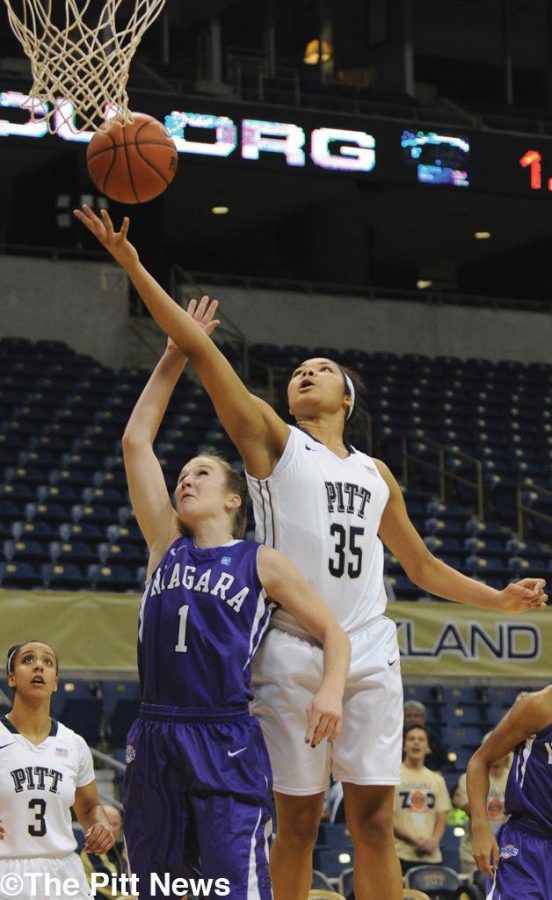Panthers face third straight ranked team on Thursday
January 15, 2015
Stasha Carey admitted it. After beating then-No. 8 North Carolina, she and the rest of the Pitt women’s basketball team reveled in the victory in the locker room.
“We got in the room and danced a lot,” the freshman forward said. “It’s crazy to be able to beat a ranked team knowing we came in as an underdog.”
But after celebrations wound down, Pitt focused on the next opponent, The Florida State Seminoles (16-2, 2-1 ACC), whom the team (11-4, 1-1 ACC) will oppose tonight at 7:00 p.m. at the Donald L. Tucker Civic Center. Like North Carolina, Florida State is ranked 20th in the country. Similar to Pitt, Florida State is coming off of its own big win — a 74-58 victory over then-No. 13 Duke.
“It’s back to business,” senior guard Brianna Kiesel said. “They’re coming off a really big win like we are, so it’s going to be a really good game.”
Head coach Suzie McConnell-Serio said she doesn’t see many weaknesses on Florida State’s team. Offensively, Florida State averages 78.7 points per game, good for 17th in the country.
“They’re definitely good at ball movement,” Carey said. “Moving without the ball, making plays, just having a good vibe together.”
Beyond ball movement, Florida State’s offensive success is largely based on the team’s balanced scoring — seven players average 7.8 points or more per game — and its ability to push the ball in transition.
As opposed to a team with one or two main scorers, the Seminoles are harder to defend because of numerous weapons.
“Usually, when there’s one specific person, you focus a lot on them,” Carey said. “But since everyone [scores], we definitely need to come in focused, ready, know what their players are doing and ready to stop them.”
In transition, Florida State thrives from the cumulative athleticism and quickness of its roster.
“They run in transition, they’re quick, they’re athletic, their post players run, so they do a great job advancing the ball and being able to score in transition,” McConnell-Serio said.
Florida State’s athleticism also bleeds into other facets of its strategy. Most notably, Florida State is one of the country’s best offensive rebounding teams, averaging 18 per game, the 10th-best in the country. In total, the Seminoles boast a 14.6 rebounding margin, fourth in the country.
Mostly, Florida State’s success on the offensive boards comes from a unique, aggressive strategy.
“They’ll send four, five players to the boards. Most teams only send three, maybe four, when they’re sending four, maybe five,” McConnell-Serio said. “They’re just persistent, and they’re relentless on the boards.”
Within that aggressiveness, however, McConnell-Serio believes her team can take advantage by getting out in transition.
“Sometimes the shooter, if it’s a [3-point shot] being taken, she’s the only one not crashing the boards,” McConnell-Serio said. “If we can rebound, we can get scores in transition.”
Individually, junior center Adut Bulgak sticks out as a particularly effective rebounder for the Seminoles, averaging 10.3 rebounds per game, 34th in the country.
Carey, who averages 8.4 rebounds, said she matches up well with Bulgak.
“It will be a good matchup. She can definitely go up and get rebounds, but I can do the same,” Carey said.
Bulgak’s success in rebounding is twofold. Not only is she individually proficient in rebounding, but her guards help free her up, effectively penetrating the hoop.
“Their guards help in that regard, because when their guards are effective at penetration, if someone’s guarding [Bulgak], your post players guarding her have to rotate and help and then you have a smaller defender rotating to her,” McConnell-Serio said.
In her own right, Bulgak excels at putting herself in mismatches by often setting on-ball screens and picking and popping, the second-year head coach added.
Though there isn’t one singular key to beating Florida State, controlling the offensive boards will go a long way in stopping its offense and getting out in transition for easier buckets against the team’s usually stout 42nd-ranked defense.
“We have to limit their second chances, not give up offensive rebounds and take away their transition,” McConnell-Serio said.
If the Panthers can follow her advice and limit transition points, they will likely put themselves in a favorable position to secure another ever-important ACC win.
“Any win is crucial in the ACC when you’re talking about the standings at the end of the year, and putting yourself in a position, if you have any aspirations of being in the postseason,” McConnell-Serio said.



